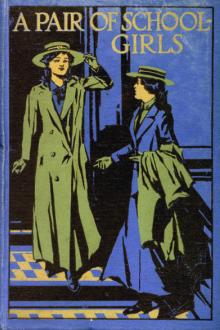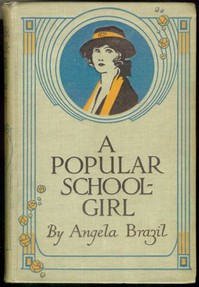The Jolliest School of All by Angela Brazil (top ebook reader .TXT) 📗

- Author: Angela Brazil
Book online «The Jolliest School of All by Angela Brazil (top ebook reader .TXT) 📗». Author Angela Brazil
Fortune cast the lot this time on Agnes, who wrinkled up her forehead and protested she didn't know anything to tell, but, when urged, remembered something she had heard during the summer holidays.
"It's true too!" she assured them. "We were staying at Tarana. We had a villa there. Water was very scarce, and we used to have two barrels of it brought every day on donkeyback by a woman whose business it was to act as carrier. Her name was Luigia, and she was very picturesque looking,[224] and had the most beautiful dark eyes, though she always looked fearfully sad. Daddy is fond of sketching, and he painted a picture of her standing with her donkey under the vines. We guessed somehow that she had a history, and we asked Sareda, our cook, about her. Sareda knew everybody in the place. She was a dear old gossip. She got quite excited over Luigia's story. She said it had been the talk of Tarana at the time. Luigia used to be a lovely girl when she was young, and she was quite wealthy for a peasant, because she owned a little lemon grove on the hillside. She inherited it from her father, who was dead. Of course, because she was beautiful and a village heiress, she soon found a sweetheart, and became engaged to Francesco, a fisherman who lived down on the Marina. Everything was going on very happily, and the wedding was fixed, when suddenly it was found there was something wrong with Luigia's glorious eyes. She went to a doctor in Naples, and he told her that unless a certain operation were performed she would go blind. If she went to Paris, to a specialist whom he named, her sight might be saved. Poor Luigia sold her lemon grove in a hurry, to get the necessary money, and packed up and started for Paris immediately. She was away six months, and she came back penniless, but seeing as well as ever. She trudged all the way from Liparo to Tarana, along the coast road, because she could not afford to take the train. When she walked into her own village,[225] the first thing she saw was a wedding party leaving the church. She stopped to watch, and as the procession passed her who should the gayly-dressed bridegroom prove to be but her own faithless sweetheart Francesco. She screamed and fainted, and some kindly neighbors took her in and cared for her. She got work afterwards in the village, but she did not find a husband, because her lemon grove was sold, and these peasants will not marry a wife without a dowry. No wonder she looked so sad. We were always frightfully sorry for her."
Sheila, who was the next entertainer, recited a ballad; and Delia also "spoke a piece," an amusing episode of child life, which she rendered with much humor. The next turn was Irene's, and the girls, who were in a mood for listening, clamored for a story.
"I haven't any first-hand or original adventures," she declared. "My aunts never have psychic experiences, and the people who brought us things to the door in London weren't interesting in the least. If you like romance, though, I remember a tale in a little old, old book that belonged to my great grandmother. It was supposed to be true, and I dare say it may have really happened, more than a hundred years ago, just as 'The Babes in the Wood' really happened in Norfolk in Elizabethan times. It's about a girl named Mary Howard. Her father and mother died when she was only four years old, and she was left an orphan. She was heiress to a very[226] great property, and her uncle, Mr. John Howard, was made her guardian. She also had another uncle, Mr. Dallas, her mother's brother, but he lived in Calcutta and she had never seen him. Mr. John Howard wished to get hold of Mary's estates for himself, so he laid a careful plot. First, he sent all the servants away, including her nurse, Betty Morris, who was devoted to her. Betty offered to stay on without wages, but when this was refused she became suspicious, and wrote a letter to Mr. Dallas warning him to look after his sister's child. But it took many months in those days for a letter to get to Calcutta, and meantime Mr. Howard was pursuing a wicked scheme. Soon afterwards Betty heard that her charge had been stolen by gypsies for the sake of her amber beads, and could not be found anywhere. What had really happened was worse even than Betty had feared. Mr. Howard had hired a sailor, who was in desperate need of money, and bribed him to decoy the child away, take her to the seaside and there drown her. Robert, the sailor, fulfilled the first part of his bargain but not the second. He carried little Mary into a remote part of Wales, but he did not do her any harm. Instead, he became extremely fond of her and determined to save her from her uncle. So he bought a passage in a vessel bound for New Zealand and took her to sea with him, pretending she was his daughter. She was a sweet, gentle little creature, and soon became a favorite on board.[227]
"Among the crew was a Maori boy named Duaterra, whose father was a great chief in New Zealand. The Captain, for some offense, ordered this boy to be flogged, and Duaterra could not forgive the indignity. He planned a terrible revenge. When they reached New Zealand he persuaded the Captain and crew to land in his father's territory; then, summoning his savage friends he ordered a general massacre and killed them all, saving only Robert and little Mary. Robert had been good to him and had given him tobacco, and Duaterra adored Mary, and called her his Mocking Bird. The Maoris plundered and burnt the ship after they had murdered the crew, but they were kind to Robert and Mary, and built a native house for them. Here they lived for four years, for they had no opportunity to escape. Robert married the chief's daughter and settled down as a member of the tribe, but he became very anxious about little Mary. He knew that Duaterra looked upon her as his prospective bride, and he could not bear to think of the lovely child ever becoming the wife of a savage.
"One day a marvelous opportunity occurred for sending Mary home. A ship put in to obtain fresh water, and on the vessel happened to be an old friend of Robert's, named John Morris, actually the brother of Betty Morris, Mary's former nurse. Robert told John the whole story and begged him to take the little girl to England, and deliver her into Betty's hands. He paid for her passage with the[228] money which Mr. Howard had given him as a bribe, and which, as he could not use money in New Zealand, he had kept buried in the ground. Mary was carried on board ship when she was fast asleep at night, and poor Robert cried like a child at parting from her. John Morris proved a faithful friend. He took Mary to London, and sent a message to his sister Betty who was then living in Devonshire. When she arrived she was able to identify her nursling, and to tell John that Mr. Dallas had arrived from Calcutta and had offered a large reward for the recovery of his niece. So Mary was placed under the guardianship of her mother's brother, who took good care both of her and her estates, and the wicked uncle was so overcome with shame, when the story of his crime got about, that he went crazy and ended his days in a lunatic asylum."
"And the best place for him, too!" commented Jess. "He must have been a brute. I dare say things like that really did happen before there were daily papers to publish photos of lost children, and when the Maoris in New Zealand were still savages. Look here, my hearties! Do you realize it's 5.35? We've got exactly ten minutes to clear up before Rachel arrives on the rampage."
"Gracious! Help me out of these duds! Rachel would never let me hear the end of it if she caught me as a May Queen. I know her sarcastic tongue," squealed Peachy. "Thanks just fifty thou[229]sand times for my birthday party. It's been absolutely prime, and I've never enjoyed anything as much for years. Sorry to send you others into the cold, cold world, but I'm afraid you'll have to scoot and change."[230]
CHAPTER XVI Concerning JuniorsThough all the Camellia Buds had keenly enjoyed Peachy's birthday festivities they were none of them satisfied to allow the mystery of the hiding of their cakes to remain unsolved. They questioned Elsie, who was often an envoy between themselves and the rest of the Transition, but Elsie professed utter ignorance, and assured them that the particular girls whom they suspected had been playing tennis during the whole of their recreation, and could not possibly have had time or opportunity to enter dormitory 13 unnoticed by some of their companions.
"We'd have seen them," declared Elsie. "Besides, they'd have boasted about it. Whoever's the trick was, it wasn't ours. If you want my opinion I should say ask some of those juniors. They're absolute imps and ready for anything."
This was quite a new view of the case. The Camellia Buds had fixed the mischief so certainly on the rival sorority that they had never thought of the younger girls. Peachy, catching Olive, Doris, and Natalie, the trio whom she had named her "triplets," taxed them solemnly with the crime. They burst out laughing.[231]
"We 'did' you neatly!"
"Were you all this time guessing it was us?"
"I expect you had a hunt for those cakes!"
Peachy focussed a





Comments (0)